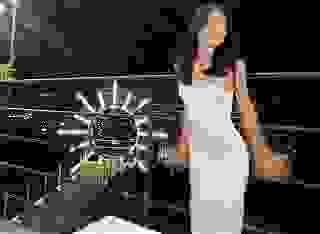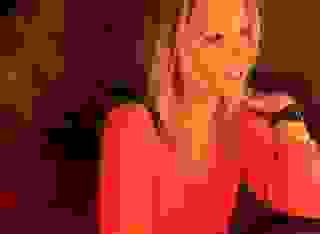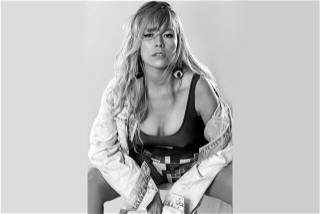- Novels and Novellas
- The Eighty-eighth Key Ch. 59
Note: You can change font size, font face, and turn on dark mode by clicking the "A" icon tab in the Story Info Box.
You can temporarily switch back to a Classic Literotica® experience during our ongoing public Beta testing. Please consider leaving feedback on issues you experience or suggest improvements.
Click herePart I
DD and the doc stayed at the place in Davos for a week, and then, after making sure Harry was in capable hands, they returned to San Francisco. Didi and the Colonel stayed at a rented chalet not far away, until Colonel Goodman returned to Israel, that is. After that, Didi moved back into her room in the main house, leaving the two remaining bedrooms for Ida and Lloyd. Harry, of course, remained hospitalized, only now at an orthopedic clinic down the valley, where reports were that he was sleeping twenty hours a day and not at all interested in his physical therapy sessions.
Didi took Lloyd to look at a couple of boarding schools, which only seemed to depress the boy more than he already was, then DD sent word that Todd Bright wanted to come to visit and the boy's spirits picked up a bit. He arrived a few days later, riding up from Zurich on the train. For Didi, anyway, things began to look up a bit.
Because more than anything -- or so it seemed after his arrival -- Todd wanted to spend time with the boy. So Lloyd took him skiing, and Didi spent a whole day with them at the new studio's construction site -- with Todd pouring over the plans with the local architect who had drawn up the plans. Lloyd joined in these brainstorming sessions and that seemed to lift his spirits further, and in the evenings Ida and Todd listened as Lloyd worked through new ideas on the Bösendorfer in the living room. So, in a way, Lloyd seemed to break free of his emotional lethargy, though the change itself seemed to be dependent on Todd Bright.
But then one day Todd announced to one and all that it was time to go visit Harry in the hospital, and Didi -- looking closely at the boy for any kind of reaction to this unexpected development -- thought she saw a shadow cross over his face. 'He feels betrayed,' she said to herself. 'I wonder why?'
+++++
The orthopedic clinic was located atop a small hill between Davos and Klosters, and every patient room had spectacular views of the alps to enliven their spirits. Some noted that the views were present to lend credibility to the somewhat exorbitant costs of treatment at the facility, but such people can never be pleased. Todd Bright was impressed with the sprawling view from the sun terrace, that much was clear, and when his nurse wheeled Callahan out into the sun Todd seemed to blossom.
Didi and Ida saw it in an instant, though Didi was almost certain that Lloyd was too inexperienced to pick up on the signals Todd was putting out. And Todd was putting on a real performance that morning, as nurses and orderlies and even a few physicians had come out to the sun terrace to see, and perhaps even meet, the most famous grunge rocker in America. Then Todd told the gathered medicos that the real star of the show was actually Harry Callahan because Harry had helped structure their last album from beginning to end. And of course, how could they not recognize Lloyd Callahan, who had played lead guitar on their tour last summer. And the truth of the matter was that everyone there had heard about Lloyd, and when they realized who he was the youngest girls seemed to grow more vapid than Didi and Ida thought humanly possible.
For his part, Harry sat in his wheelchair under a very heavy blanket, his attentions focused somewhere in the clouds, and Ida couldn't stand it anymore. She went to Callahan's chair and pushed him to a far corner; then she pulled up a chair and leaned into him, kind of face to face, or so you might say.
"What the fuck is wrong with you, Harry?" she hissed. "You have decided to sleep your life away? Is that it? When you have before you the most important task a man can have? To raise his son, to make of the boy a life both can be proud of? You will meet his need by...sleeping? By...staring at the clouds? Harry? What has happened to you?"
Harry looked at her, his eyes glazed and unfocused. "Morphine," he managed to say as a wad of spittle formed at the corner of his mouth before it rolled down his chin.
"What? Do you want more morphine?"
Harry shook his head. "No. Too much morphine. Stop them."
Todd came over and sat with Harry after that. In fact, Todd spent over an hour with Harry, talking incessantly about the new album, hoping Harry would still be able to add a few more contributions before Todd wrapped up production.
"Harry? You look positively stoned!" Todd said at one point, and Harry nodded.
"Morphine," he managed to say.
"Ooh, isn't it wonderful? I am so envious!"
Callahan felt like he was trying to walk through mud up to his armpits, and he couldn't understand how anyone would find that wonderful. "How is Lloyd doing," Harry asked Todd when he found his breath.
"Wonderful, Harry! Just peachy! He's not quite as accomplished on the piano yet, but in a few years? Who knows...?"
Harry smiled. "I'm glad you think so. But you'll need to push him, to keep him focused."
"Okay. What did you have in mind?"
"The piece we were working on? Have you shown it to him?"
"The Fandango? No, not yet -- I was waiting for you. Do you want me to show him? Really?"
But then Harry nodded. "See what he comes up with on his own. Work with him, give him your input after that, then drop by and show me what you two come up with."
And now, by effectively pushing Todd Bright into the role of intermediary between father and son, Harry had given Todd just the entry he needed...and everyone noticed how happy Todd became after that one brief exchange.
But when Ida came over and tried to speak to Lloyd, she found an entirely different reaction than what she had expected. "What's wrong, Lloyd?" she asked -- because she had seen the dark look in his eyes, a look that had, for a moment, well and truly frightened her. "Did something...?"
But then Lloyd had cut her off with a curt nod, yet with a faraway look in his eyes that somehow, to Ida, anyway, seemed alive with barely restrained fury. "Yeah," the boy added a moment later. "It kinda looks like Todd wants to be my mother. And you know, the funny thing is I'm not so sure dad would mind if that happened..."
+++++
Bright had toured in Spain several years before and one evening, with no concert scheduled, the group had gone off in search of fun. For Todd Bright, fun meant inspiration, and as he'd heard all about flamenco off the group went -- in search of Spanish dancers. Yet flamenco is more like a regional dialect, with different regions in Spain and, to a degree, Portugal, practicing different forms and, at the same time, celebrating different aspects of the confrontation between guitarist and dancer. In many parts of Spain, and yes, Portugal, there is another form, a perhaps even more celebrated form of 'flamenco', referred to as a fandango.
At their heart, these dances appear to be a contest of wills, so yes, in a sense the musical representation of human confrontation, yet Todd Bright found that he was captivated by the dialogue between the guitarist and the dancer, or between the hands of the guitarist and the dancer's feet. Then he learned that he had just seen the performance of a fandango, not what some might argue was the more generic flamenco, and he became intrigued. First with the conditions that gave rise to the form, then more and more with the specific structures of the dance.
And at one point he ran into an interesting anecdote about the fandango that captured his imagination, and he was soon consumed with the idea of writing a song that captured the essence of the tale. In the telling of the tale, Todd heard, the clergy in Spain had, several hundred years ago, first heard about the fandango and had immediately decided to decree that such exhibitions of godlessness were a form of heresy. But as sometimes happens -- though perhaps not frequently enough -- the voice of reason interrupted these proceedings and one of the clerics advised that it was simply unfair to ban such things without first hearing and experiencing the music for themselves. What followed was, for Todd Bright, the start of a quest birthed in a moment of pure reason...
The clerics invited the best fandango dancers and musicians in the region to perform, and in short order, the magic of the music captivated everyone in attendance, and so, of course, all talk of banning the music simply disappeared. And while this episode is instructive it is not the equal of, say, rediscovering Aristotle's lost manuscripts and kicking off the enlightenment, yet, for artists and musicians in ultra-conservative Spain, freeing the fandango was a sort of watershed moment...
...and it was this moment that fascinated Todd Bright...
Because in the America of the 1990s and early 2000s, there was even then a hidden hand restlessly and relentlessly at work, a re-emergent censoriousness in the evangelical community trying to reassert control of young peoples' minds all around the country through both ecclesiastical as well as political means. And without being too blunt about these things, groups like Bright were nothing less than the antithesis of this Christian power grab; yet in the centuries-old anecdote of the fandango, Todd Bright had found the germ of an idea he just couldn't shake...
So when he first voiced his desire to work with Harry on a new fandango -- an American Fandango, as he called the idea he was working on -- he saw Harry as the perfect voice to help construct the foundation of his piece. Gershwin had been a heretic, at least for most classically trained musicians in the 1920s, when his works first gained wide appeal, but then again so had Elvis Presley's gyrating electro-acoustic songs in the 50s. The same impulsive reluctance greeted Brian Wilson and the Beach Boys, then it almost engulfed artists as different as Marvin Gaye and Stephen Stills. What Todd wanted to explore was as complex as it was enduring; was this reluctance a simple generational conflict or was something far more destructive at work? Was the inherent romanticism in voices like Gershwin and Presley and Wilson, like that faced by the ecclesiastical power structures in 17th century Spain, so threatening to the pillars of establishment music that they always felt they had no recourse other than to resist change? Given that change is now and has always been inevitable?
After listening to Todd lay out these ideas, Harry simply got into the whole thing. Todd had constructed a puzzle with no easy way out, however, and yet Harry saw this from the inception. How could modern forms of rock, especially something as powerfully dissonant as Seattle Grunge, produce a coherent narrative about what amounted to a cyclical romantic impulse always challenging established forms of expression -- and in just a few minutes?
Impossible? Not hardly, or so Todd said. Zeppelin had done as much, he added, with both Kashmir and Stairway, and The Beatles had done so more times than he could count, so really, the only differences involved incorporating the structural elements of the fandango into the grunge-rock soundscape.
For Harry, however, his idea of a solution was simpler still.
The fandango employs a beat in 6/8 (classical) or ¾ (modern) time and employs octosyllabic verse, so those two elements would provide the only constraints Harry would have to deal with, and because Todd wanted to stick with the older time structure that wasn't going to be an issue he'd have to deal with either. The only question left to be answered was key, and Todd wanted to keep to a major key, even though older forms employed a minor-major format. So...done...again.
And while Harry and Todd had worked on ideas, even getting as far as putting a few down on paper, the next thing Harry knew he was flat on his back in a hospital and it was beginning to feel a little like music was about to be yanked from his life. On the crest of that revelation, Callahan found the idea of writing music quaintly quixotic and suddenly out of reach, and his descent into the darkest imaginable place began in earnest.
Now sitting in the sun and looking down the valley towards Klosters he felt a sudden elation. 'Maybe I can do this,' he thought as a shock of alpine breeze ran through his hair. 'Maybe I can work through my son's hands, realize what I saw in my mind...'
"At least until I can knock out rehab and get back to the piano..." Callahan said.
"What did you say, Harry?" Todd asked.
"I've got to get back to my piano."
"Your piano?" Didi said, clearly concerned now. "Which piano, Harry?"
"Mother's. The old Bösendorfer from the house."
Didi grabbed her notepad and began a new to-do list. "What else do you need, Harry?"
"Why am I in a wheelchair?" Harry asked.
Didi and Todd came close now, and she took his hand. "Harry? Your right leg was in bad shape. Your femur was shattered and the knee wasn't replaceable, then an infection set in. They took your right leg two days after you..."
"Oh," he said, interrupting her. "That's strange. Why didn't anyone tell me?"
"We did, Harry."
"It's the morphine," Callahan sighed. "Tell the docs no more. None. I can't do this if they keep me doped up."
Lloyd walked up and looked into his father's eyes, not sure what he was seeing now but oddly reassured. "Dad, you feeling okay?"
And Harry nodded. "I am. And son, I need you, so stop trying to avoid me. Please."
Part II
After their first afternoon together on the clinic's sun terrace, Todd Bright returned almost daily to visit with Harry. And who knows, maybe Callahan was indeed truly clueless, or maybe he was just lonely. And because Todd wasn't just a vestigial remnant of his other life -- the life he'd been forced to leave behind in California -- Harry must have begun to see and feel that Todd Bright was a kind of life preserver. Tossed to a drowning man clinging to the last of his reserves, Todd was a musician speaking to the same needs Callahan had tried to address his whole life -- first with and through his mother and then by playing the piano more and more on his own. And now, as they'd embarked on this peculiar musical journey together, Todd and Harry had formed a rather unique type of bond -- that of creative collaborators.
You just had to speak the language to know what it was that had developed between the two. It wasn't a romance even if, on some levels, their collaboration was about romance. Their affinity wasn't sexual, at least not on Callahan's part, because he'd long known he simply wasn't wired that way. Yet Didi saw something...an unusual attraction developing between the two...even if Todd was the one smitten.
So when he came to the clinic to visit Callahan, Todd came as a musician and as a kind of paramour, one coming at Callahan from an unexpected angle. Nurses and therapists saw it and were sophisticated enough to ignore Bright's surreptitious sidelong glances, yet when Didi was around she sensed trouble. Maybe like seismic shifts deep within the earth and how clusters of such events foretell a magmatic eruption, she was watching two men with wildly different expectations working towards a single outcome -- the composition of a piece of music -- yet the inevitable outcome was anything but a foregone conclusion.
And maybe Callahan felt the first rumblings of that peculiar shift when Todd started being a little more physical when he visited. Little things, really, like a hand on the shoulder, or even pushing Callahan's wheelchair, even when orderlies were standing by to do the chore. Then he showed up in time for physical therapy one morning, watching Callahan struggle with even the simplest arm movements once the shattered arm was removed from casts and traction. And then Todd was there, but now more as a cheerleader, pushing Harry to work harder because so much was at stake now.
Lloyd dropped by from time to time and he had no trouble at all seeing what was going down, and though he did indeed think his father was clueless that didn't, in his mind anyway, excuse him. In fact, his father's apparent cluelessness only made him angrier.
Perhaps because Lloyd saw this whole fandango thing as a means to an end. Todd's means to Todd's ends. And Lloyd simply decided he wasn't going to drawn into such a charade.
So when Todd started to talk openly about moving into the house, Ida was gobsmacked -- but Lloyd wasn't...not even a little bit. By that time, after Todd's open flirtations and what Lloyd perceived as a ruinous influence, the boy had made already made up his mind and knew what needed to be done.
So one morning, while Todd was visiting Harry at the Clinic, he found a copy of his grandmother's Fourth Piano Concerto and began playing -- right through to the bitter end.
Part III
And then one day Todd didn't come to the clinic.
And even Harry's nurses and therapists stayed away, too.
And the next day? No one came, again.
Yet on the third day several people came. Detectives and uniformed police officers from the cantonal police department. And, as it happened, and as irony is a universal construct, most of them were homicide detectives.
And they wanted to know if Lloyd had been in contact with him.
"No? But will someone, anyone, tell me what's going on?"
But no, not even one of them would. Not a single one.
And still, the staff at the clinic stayed away from Harry Callahan, and soon he began to think the whole world had forsaken him.
+++++
It was almost two weeks before Didi came to his room, and she did not look herself.
She was evasive, she didn't make eye contact. She spoke in oblique references to vague goings-on until Harry had had enough.
"You need to tell me what's happening, Didi. You can't keep me in the dark forever."
"It is very complicated here now, Mr. Callahan..."
And it was the way she said 'Mr. Callahan' that cued him in. She was wearing a wire and under duress.
"Just the broad strokes, Didi. What's happened?"
"Lloyd and Mr. Bright got into an argument -- in the meadow behind the house. It appears that someone, perhaps your son, concealed a firearm when he entered the country, and during this argument, your son shot and killed Mr. Bright..."
"I see."
"There were several witnesses, Mr. Callahan, so there is no doubt about what happened."
"Uh-huh."
"There are, however, several questions about events immediately after Mr. Bright's murder."
"Okay."
"It seems that an Old Man appeared beside your son just a few moments after the event, and then everyone simply disappeared."
"Disappeared? What do you mean, disappeared?"
"Just that, sir. And all the available witnesses report exactly the same thing; that within seconds of the single gunshot an Old Man appeared in the meadow beside your son, and almost as quickly your son disappeared, presumably with the Old Man."
Callahan nodded. "What gun did he use?"
"Your old duty revolver. The Smith & Wesson Model 29; it is still registered with the police department in San Francisco so there is no doubt of ownership."
Callahan shook his head. "I left it in the safe. At the house in Sea Ranch. And there's no way Lloyd knew the combination to that safe...which means someone..."
And then Callahan remembered she was wearing a wire.
"Which means someone broke into my house and removed the pistol. You'd better call DD and let her know."
"I already have. There was no sign of forced entry or anything else to indicate the safe has been tampered with."
"So...somehow Lloyd got the combination."
"You didn't bring the weapon with you when you came?"
"Didi, how could I have. I never left the hospital, remember? I didn't pack my bags, I didn't even know we were leaving..."
"Is there any way Ida, your employee from the Music Company, might have gotten hold of the combination?"
"There's no way I can think of, but then again I have no idea how Lloyd could have gotten hold of the combination."








